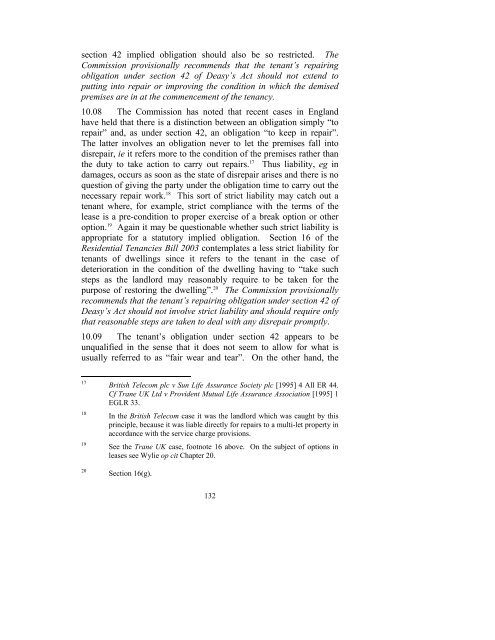Consultation Paper on the General Law of the Landlord and Tenant
Consultation Paper on the General Law of the Landlord and Tenant
Consultation Paper on the General Law of the Landlord and Tenant
You also want an ePaper? Increase the reach of your titles
YUMPU automatically turns print PDFs into web optimized ePapers that Google loves.
secti<strong>on</strong> 42 implied obligati<strong>on</strong> should also be so restricted. TheCommissi<strong>on</strong> provisi<strong>on</strong>ally recommends that <strong>the</strong> tenant’s repairingobligati<strong>on</strong> under secti<strong>on</strong> 42 <strong>of</strong> Deasy’s Act should not extend toputting into repair or improving <strong>the</strong> c<strong>on</strong>diti<strong>on</strong> in which <strong>the</strong> demisedpremises are in at <strong>the</strong> commencement <strong>of</strong> <strong>the</strong> tenancy.10.08 The Commissi<strong>on</strong> has noted that recent cases in Engl<strong>and</strong>have held that <strong>the</strong>re is a distincti<strong>on</strong> between an obligati<strong>on</strong> simply “torepair” <strong>and</strong>, as under secti<strong>on</strong> 42, an obligati<strong>on</strong> “to keep in repair”.The latter involves an obligati<strong>on</strong> never to let <strong>the</strong> premises fall intodisrepair, ie it refers more to <strong>the</strong> c<strong>on</strong>diti<strong>on</strong> <strong>of</strong> <strong>the</strong> premises ra<strong>the</strong>r than<strong>the</strong> duty to take acti<strong>on</strong> to carry out repairs. 17 Thus liability, eg indamages, occurs as so<strong>on</strong> as <strong>the</strong> state <strong>of</strong> disrepair arises <strong>and</strong> <strong>the</strong>re is noquesti<strong>on</strong> <strong>of</strong> giving <strong>the</strong> party under <strong>the</strong> obligati<strong>on</strong> time to carry out <strong>the</strong>necessary repair work. 18 This sort <strong>of</strong> strict liability may catch out atenant where, for example, strict compliance with <strong>the</strong> terms <strong>of</strong> <strong>the</strong>lease is a pre-c<strong>on</strong>diti<strong>on</strong> to proper exercise <strong>of</strong> a break opti<strong>on</strong> or o<strong>the</strong>ropti<strong>on</strong>. 19 Again it may be questi<strong>on</strong>able whe<strong>the</strong>r such strict liability isappropriate for a statutory implied obligati<strong>on</strong>. Secti<strong>on</strong> 16 <strong>of</strong> <strong>the</strong>Residential Tenancies Bill 2003 c<strong>on</strong>templates a less strict liability fortenants <strong>of</strong> dwellings since it refers to <strong>the</strong> tenant in <strong>the</strong> case <strong>of</strong>deteriorati<strong>on</strong> in <strong>the</strong> c<strong>on</strong>diti<strong>on</strong> <strong>of</strong> <strong>the</strong> dwelling having to “take suchsteps as <strong>the</strong> l<strong>and</strong>lord may reas<strong>on</strong>ably require to be taken for <strong>the</strong>purpose <strong>of</strong> restoring <strong>the</strong> dwelling”. 20 The Commissi<strong>on</strong> provisi<strong>on</strong>allyrecommends that <strong>the</strong> tenant’s repairing obligati<strong>on</strong> under secti<strong>on</strong> 42 <strong>of</strong>Deasy’s Act should not involve strict liability <strong>and</strong> should require <strong>on</strong>lythat reas<strong>on</strong>able steps are taken to deal with any disrepair promptly.10.09 The tenant’s obligati<strong>on</strong> under secti<strong>on</strong> 42 appears to beunqualified in <strong>the</strong> sense that it does not seem to allow for what isusually referred to as “fair wear <strong>and</strong> tear”. On <strong>the</strong> o<strong>the</strong>r h<strong>and</strong>, <strong>the</strong>17181920British Telecom plc v Sun Life Assurance Society plc [1995] 4 All ER 44.Cf Trane UK Ltd v Provident Mutual Life Assurance Associati<strong>on</strong> [1995] 1EGLR 33.In <strong>the</strong> British Telecom case it was <strong>the</strong> l<strong>and</strong>lord which was caught by thisprinciple, because it was liable directly for repairs to a multi-let property inaccordance with <strong>the</strong> service charge provisi<strong>on</strong>s.See <strong>the</strong> Trane UK case, footnote 16 above. On <strong>the</strong> subject <strong>of</strong> opti<strong>on</strong>s inleases see Wylie op cit Chapter 20.Secti<strong>on</strong> 16(g).132
















